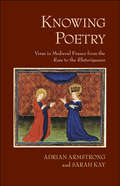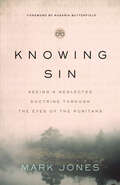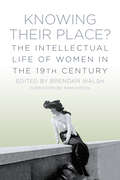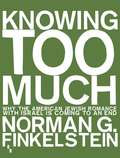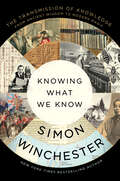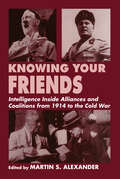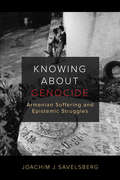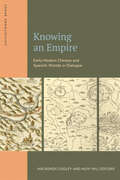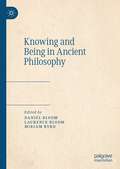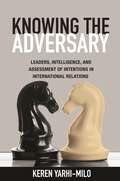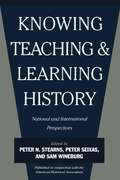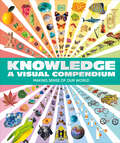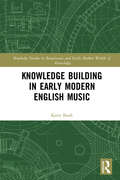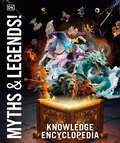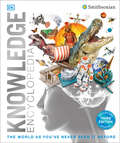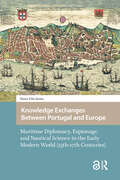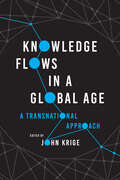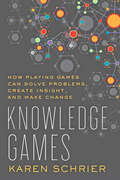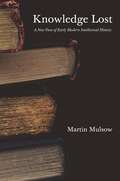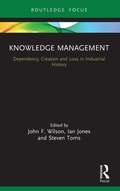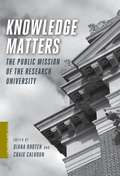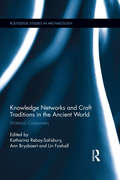- Table View
- List View
Knowing Poetry: Verse in Medieval France from the "Rose" to the "Rhétoriqueurs"
by Sarah Kay Adrian ArmstrongIn the later Middle Ages, many writers claimed that prose is superior to verse as a vehicle of knowledge because it presents the truth in an unvarnished form, without the distortions of meter and rhyme. Beginning in the thirteenth century, works of verse narrative from the early Middle Ages were recast in prose, as if prose had become the literary norm. Instead of dying out, however, verse took on new vitality. In France verse texts were produced, in both French and Occitan, with the explicit intention of transmitting encyclopedic, political, philosophical, moral, historical, and other forms of knowledge. In Knowing Poetry, Adrian Armstrong and Sarah Kay explore why and how verse continued to be used to transmit and shape knowledge in France. They cover the period between Jean de Meun’s Roman de la rose (c. 1270) and the major work of Jean Bouchet, the last of the grands rhétoriqueurs (c. 1530). The authors find that the advent of prose led to a new relationship between poetry and knowledge in which poetry serves as a medium for serious reflection and self-reflection on subjectivity, embodiment, and time. They propose that three major works—the Roman de la rose, the Ovide moralisé, and Boethius’ Consolation of Philosophy—form a single influential matrix linking poetry and intellectual inquiry, metaphysical insights, and eroticized knowledge. The trio of thought-world-contingency, poetically represented by Philosophy, Nature, and Fortune, grounds poetic exploration of reality, poetry, and community.
Knowing Sin: Seeing a Neglected Doctrine Through the Eyes of the Puritans
by Mark JonesThe first rule of combat is: know your enemy.We don&’t talk a lot about sin these days. But maybe we should. The Puritans sure did—because they understood sin&’s deceptive power and wanted to root it out of their lives. Shouldn&’t we want the same?Though many books have been written on the &“doctrine of sin,&” few are as practical and applicable as this one. In Knowing Sin, Mark Jones puts his expertise in the Puritans to work by distilling the vast wisdom of our Christian forebears into a single volume that summarizes their thought on this vital subject. The result isn&’t a theological tome to sit on your shelf and gather dust, but a surprisingly relevant book to keep by your bedside and refer to again and again. You&’ll come to understand topics like:Sin&’s OriginSin&’s GriefSin&’s ThoughtsSin&’s TemptationsSin&’s MiserySin&’s Secrecyand of course . . . Sin&’s Defeat!None of us is free from the struggle with sin. The question isn&’t whether we&’re sinful, it&’s what we&’re doing about it. Thanks be to God, there is a path to overcoming sin. And the first step on that path to victory is knowing what we&’re up against. Start Knowing Sin today!
Knowing Sin: Seeing a Neglected Doctrine Through the Eyes of the Puritans
by Mark JonesThe first rule of combat is: know your enemy.We don&’t talk a lot about sin these days. But maybe we should. The Puritans sure did—because they understood sin&’s deceptive power and wanted to root it out of their lives. Shouldn&’t we want the same?Though many books have been written on the &“doctrine of sin,&” few are as practical and applicable as this one. In Knowing Sin, Mark Jones puts his expertise in the Puritans to work by distilling the vast wisdom of our Christian forebears into a single volume that summarizes their thought on this vital subject. The result isn&’t a theological tome to sit on your shelf and gather dust, but a surprisingly relevant book to keep by your bedside and refer to again and again. You&’ll come to understand topics like:Sin&’s OriginSin&’s GriefSin&’s ThoughtsSin&’s TemptationsSin&’s MiserySin&’s Secrecyand of course . . . Sin&’s Defeat!None of us is free from the struggle with sin. The question isn&’t whether we&’re sinful, it&’s what we&’re doing about it. Thanks be to God, there is a path to overcoming sin. And the first step on that path to victory is knowing what we&’re up against. Start Knowing Sin today!
Knowing Their Place?: The Intellectual Life of Women in the 19th Century
by Brendan Walsh Pam HirschKnowing their Place is a comprehensive account of the public, private and intellectual life of Irish women in the Victorian age. In particular, this book looks at the steady progress of girls and women within the education system, their gradual involvement in intellectual life through amateur societies (such as the Royal Dublin Society); their emergence of independent, highly motivated scholarly and philanthropic individuals who operated within local spheres with often very considerable degrees of success and influence.
Knowing Too Much: Why the American Jewish Romance With Israel is Coming to an End
by Norman G. FinkelsteinTraditionally, American Jews have been liberal in their political outlook; indeed African-Americans are the only ethnic group more likely to vote Democrat in US elections. Over the past half century, however, attitudes on one topic have stood in sharp contrast to this group's generally progressive stance: support for Israel. Despite Israel's record of militarism, illegal settlements and human rights violations, American Jews have, stretching back to the 1960s, remained largely steadfast supporters of the Jewish "homeland." But, as Norman Finkelstein explains in an elegantly-argued and richly-textured new book, this is now beginning to change. Reports by Human Rights Watch, Amnesty International and the United Nations, and books by commentators as prominent and authoritative as President Jimmy Carter, Stephen Walt, John Mearsheimer and Peter Beinart, have increasingly pinpointed the fundamental illiberalism of Israeli policies. In the light of these exposes, the support of American Jews for Israel has begun to fray. This erosion has been particularly marked among younger members of the community. In successive chapters that combine Finkelstein's customary meticulous research with polemical brio, Knowing Too Much sets the work of defenders of Israel such as Jeffrey Goldberg, Michael Oren, Dennis Ross and Benny Morris against the historical record, showing their claims to be ever more tendentious. As growing numbers of American Jews come to see the speciousness of such arguments and recognize Israel's record as simply indefensible, Finkelstein points to the opening of new possibilities for political advancement in a region that, for decades, has been stuck in a gridlock of injustice and suffering. Norman G. Finkelstein is the author of seven books: What Gandhi Says, "This Time We Went Too Far", Beyond Chutzpah, The Holocaust Industry, Image and Reality of the Israel-Palestine Conflict, A Nation on Trial (with Ruth Bettina Birn), and The Rise and Fall of Palestine.
Knowing What We Know: The Transmission of Knowledge: From Ancient Wisdom to Modern Magic
by Simon Winchester“A delightful compendium of the kind of facts you immediately want to share with anyone you encounter . . . . Simon Winchester has firmly earned his place in history . . . as a promulgator of knowledge of every variety, perhaps the last of the famous explorers who crisscrossed the now-vanished British Empire and reported what they found to an astonished world.” — New York TimesFrom the creation of the first encyclopedia to Wikipedia, from ancient museums to modern kindergarten classes—this is award winning writer Simon Winchester’s brilliant and all-encompassing look at how humans acquire, retain, and pass on information and data, and how technology continues to change our lives and our minds.With the advent of the internet, any topic we want to know about is instantly available with the touch of a smartphone button. With so much knowledge at our fingertips, what is there left for our brains to do? At a time when we seem to be stripping all value from the idea of knowing things—no need for math, no need for map-reading, no need for memorization—are we risking our ability to think? As we empty our minds, will we one day be incapable of thoughtfulness? Addressing these questions, Simon Winchester explores how humans have attained, stored, and disseminated knowledge. Examining such disciplines as education, journalism, encyclopedia creation, museum curation, photography, and broadcasting, he looks at a whole range of knowledge diffusion—from the cuneiform writings of Babylon to the machine-made genius of artificial intelligence, by way of Gutenberg, Google, and Wikipedia to the huge Victorian assemblage of the Mundanaeum, the collection of everything ever known, currently stored in a damp basement in northern Belgium. Studded with strange and fascinating details, Knowing What We Know is a deep dive into learning and the human mind. Throughout this fascinating tour, Winchester forces us to ponder what rational humans are becoming. What good is all this knowledge if it leads to lack of thought? What is information without wisdom? Does Rene Descartes’s Cogito, ergo sum—“I think therefore I am,” the foundation for human knowledge widely accepted since the Enlightenment—still hold? And what will the world be like if no one in it is wise?
Knowing Your Friends: Intelligence Inside Alliances and Coalitions from 1914 to the Cold War (Studies in Intelligence)
by Martin S. AlexanderLittle attention has been paid to the murky, ultra-business of gathering intelligence among and forming estimates about friendly powers, and friendly or allied military forces. How rarely have scholars troubled to discover when states entered into coalitions or alliances mainly and explicitly because their intelligence evaluation of the potential partner concluded that making the alliance was, from the originator's national security interest, the best game in town. The twentieth century has been chosen to enhance the coherence of and connections between, the subject matter of this under-explored part of intelligence studies.
Knowing about Genocide: Armenian Suffering and Epistemic Struggles
by Joachim J. SavelsbergA free open access ebook is available upon publication. Learn more at www.luminosoa.org. This book is freely available in an open access edition thanks to TOME (Toward an Open Monograph Ecosystem)—a collaboration of the Association of American Universities, the Association of University Presses, and the Association of Research Libraries—and the generous support of the University of Minnesota. Learn more at the TOME website, available at openmonographs.org. How do victims and perpetrators generate conflicting knowledge about genocide? Using a sociology of knowledge approach, Savelsberg answers this question for the Armenian genocide committed in the context of the First World War. Focusing on Armenians and Turks, he examines strategies of silencing, denial, and acknowledgment in everyday interaction, public rituals, law, and politics. Drawing on interviews, ethnographic accounts, documents, and eyewitness testimony, Savelsberg illuminates the social processes that drive dueling versions of history. He reveals counterproductive consequences of denial in an age of human rights hegemony, with implications for populist disinformation campaigns against overwhelming evidence.
Knowing an Empire: Early Modern Chinese and Spanish Worlds in Dialogue (ASIANetwork Books)
by Mackenzie Cooley Wu HuiyiKnowing an Empire: Early Modern Chinese and Spanish Worlds in Dialogue unveils how these two vast empires, separated by thousands of miles, developed comparable systems to gather, order, and wield knowledge about their local worlds in the process of empire-building. From the sixteenth to the eighteenth centuries, officials in both empires compiled large quantities of structured data on the climate, topography, natural products, languages, religions, and more of their locales, creating a vision of their empires as diverse yet unified. Through a new methodology of “juxtapositional comparison,” the book reads the difangzhi 地方志 (local gazetteers) of China and the relaciones geográficas of the Spanish world in parallel. Knowing an Empire does not see the conveyance of information across an empire as a top-down process with an active center as a knowledge-maker. Instead, it amplifies a blend of voices that speak as much to imperial bureaucracy as to the rich local and Indigenous cultures, revealing these two early modern empires as diverse polities whose equilibria were constantly rebalanced among local powers. Comprised of 18 chapters, this edited collection reflects on the historical evolution and inner structures of the imperial epistemologies, as well as the many ways historians today read difangzhi and relaciones geográficas to understand the spatial, natural, and social order in both the Chinese and the Spanish empires. At once a comparative and a connected history, it places Chinese and Spanish imperial knowledge in the globalizing early modern world, highlighting the migration of people, goods, and ideas and revealing how these wide-ranging influences are reflected—or not—in the difangzhi and the relaciones. The book concludes by broadening our scope beyond China and Spain to reflect how other early modern empires, such as the Portuguese, failed to develop such systematized imperial genres. With contributions from leading scholars across Latin American and Asian Studies, this book synthesizes political, environmental, and socio-economic history with historical anthropology to highlight parallel governance and knowledge structures. The contributors challenge conventional binaries of Western versus Eastern, and colonial versus non-colonial, presenting a nuanced perspective of early modern empires as dynamic, interconnected entities through the shared challenges of scale, diversity, and increasing globalization. Through these dialogues, Knowing an Empire illuminates the complex entanglement of ruling and understanding. This groundbreaking collection offers a highly innovative and dialogic approach to comparative studies of empires, with major implications for Asian, European, Latin American, transnational, and global history.
Knowing and Being in Ancient Philosophy
by Daniel Bloom Laurence Bloom Miriam ByrdThis collected volume is inspired by the work of Edward Halper and is historically focused with contributions from leading scholars in Ancient and Medieval philosophy. Though its chapters cover a diverse range of topics in epistemology, ethics, and political philosophy, the collection is unified by the contributors’ consideration of these topics in terms of the fundamental questions of metaphysics. The first section of the volume, “Knowing and Being,” is dedicated to the connection between metaphysics and epistemology and includes chapters on Heraclitus, Plato, Aristotle, and the Ancient Daoists. The second section, “Goodness as Knowing How to Be,” addresses ethics as an outgrowth of human metaphysical concerns and includes chapters on Plato, Aristotle, and Maimonides. Contributors include William H. F. Altman, Luc Brisson, Ronna Burger, Miriam Byrd, Owen Goldin, Lenn Goodman, Mitchell Miller, Richard Parry, Richard Patterson, Nastassja Pugliese, John Rist, May Sim, Roslyn Weiss, and Chad Wiener.
Knowing the Adversary: Leaders, Intelligence, and Assessment of Intentions in International Relations (Princeton Studies in International History and Politics #146)
by Keren Yarhi-MiloStates are more likely to engage in risky and destabilizing actions such as military buildups and preemptive strikes if they believe their adversaries pose a tangible threat. Yet despite the crucial importance of this issue, we don't know enough about how states and their leaders draw inferences about their adversaries' long-term intentions. Knowing the Adversary draws on a wealth of historical archival evidence to shed new light on how world leaders and intelligence organizations actually make these assessments.Keren Yarhi-Milo examines three cases: Britain's assessments of Nazi Germany's intentions in the 1930s, America's assessments of the Soviet Union's intentions during the Carter administration, and the Reagan administration's assessments of Soviet intentions near the end of the Cold War. She advances a new theoretical framework—called selective attention—that emphasizes organizational dynamics, personal diplomatic interactions, and cognitive and affective factors. Yarhi-Milo finds that decision makers don't pay as much attention to those aspects of state behavior that major theories of international politics claim they do. Instead, they tend to determine the intentions of adversaries on the basis of preexisting beliefs, theories, and personal impressions. Yarhi-Milo also shows how intelligence organizations rely on very different indicators than decision makers, focusing more on changes in the military capabilities of adversaries.Knowing the Adversary provides a clearer picture of the historical validity of existing theories, and broadens our understanding of the important role that diplomacy plays in international security.
Knowing, Teaching, and Learning History: National and International Perspectives
by Sam Wineburg Peter N. Stearns Peter SeixasOn January 18,1995, the "History Wars," to that point confined largely to skirmishes on op-ed pages of the New York Times and Washington Post, erupted on the floors of the United States Congress.
Knowledge A Visual Compendium: Making Sense of our World
by DKEver wondered how many moons there are in our solar system, or the number of Olympic sports, or who the 46 US presidents were? If so, this is the book for you!Leaf through the pages of this beautiful book and you’ll find an intriguing array of objects, animals, lists, and artifacts from nature, science, technology, the arts, and history, which illustrate how we order, understand, and make sense of the world. Discover the 40 orders of birds, the 13 levels of the Beaufort Wind Scale, the 88 constellations, the 36 Morse Code symbols, the 206 bones in the human body, and much more!With its combination of attractive, timeless images and expert, engaging text, The Knowledge Compendium Book is perfect for children (and adults!) who are curious about the world and the lists, systems, and categories that help us understand it.
Knowledge Building in Early Modern English Music (Routledge Studies in Renaissance and Early Modern Worlds of Knowledge)
by Katie BankKnowledge Building in Early Modern English Music is a rich, interdisciplinary investigation into the role of music and musical culture in the development of metaphysical thought in late sixteenth-, early seventeenth-century England. The book considers how music presented questions about the relationships between the mind, body, passions, and the soul, drawing out examples of domestic music that explicitly address topics of human consciousness, such as dreams, love, and sensing. Early seventeenth-century metaphysical thought is said to pave the way for the Enlightenment Self. Yet studies of the music’s role in natural philosophy has been primarily limited to symbolic functions in philosophical treatises, virtually ignoring music making’s substantial contribution to this watershed period. Contrary to prevailing narratives, the author shows why music making did not only reflect impending change in philosophical thought but contributed to its formation. The book demonstrates how recreational song such as the English madrigal confronted assumptions about reality and representation and the role of dialogue in cultural production, and other ideas linked to changes in how knowledge was built. Focusing on music by John Dowland, Martin Peerson, Thomas Weelkes, and William Byrd, this study revises historiography by reflecting on the experience of music and how music contributed to the way early modern awareness was shaped.
Knowledge Encyclopedia Myths and Legends
by DKDK’s best-selling illustrated encyclopedia series explores the fantastical world of myths and legends.Discover stories from myth and legend as you've never seen them before through incredibly detailed 3D illustrations in this encyclopedia for children aged 9+.Knowledge Encyclopedia’s clear explanations, illustrations, photographs, and 3D images will engage children in complex subjects. Find yourself transported to a realm of myth and legend with this perfect gift for anyone who loves stories of gods, monsters, and heroes.This all-encompassing myth encyclopedia for kids offers:An impressive collection of facts, charts, timelines, and illustrations.A visual approach using illustrations, photographs, and extremely detailed 3D CGI images.Clear explanations and retellings of different myths and legends from around the world.Children can explore mythology in a new and exciting way through spectacular computer-generated images of key heroes, gods, monsters, and locations. This new book in the Knowledge Encyclopedia series will inspire children with vivid depictions of scenes from the stories, and their retellings and explanations of the myths.Bringing tales from mythology and folklore to life, Knowledge Encyclopedia: Myths and Legends! lets children peer inside legendary buildings such as the Slavic Baba Yaga’s chicken-legged hut, and get up close to their favorite animal heroes, from China’s irrepressible Monkey King to West Africa’s spider trickster Anansi.More in the seriesKnowledge Encyclopedia Myths and Legends! is part of DK’s visual and hugely successful Knowledge Encyclopedia series. Complete the collection and dive into the deep with Knowledge Encyclopedia Ocean!, take a trip to the solar system with Knowledge Encyclopedia Space!, and travel back to prehistoric times with Knowledge Encyclopedia Dinosaur!
Knowledge Encyclopedia: The World as You've Never Seen it Before (DK Knowledge Encyclopedias)
by DKChange the way you see the world, with a groundbreaking visual approach to the wonders of our planet, in this fully updated edition.Explore the universe, from the inside of an atom to black holes, then discover the explosive science behind a fireworks display. This fully updated third edition of Knowledge Encyclopedia will continue to fascinate young readers with its microscopic detail and amazing facts on a huge range of topics. Children aged 9+ will find themselves totally absorbed in complex subjects, made clear through engaging explanations, intricate illustrations, vivid photographs, and striking 3D images. From Viking raiders and Samurai warriors to robotics and chemical reactions, amazing animals, the human body, the marvels of history, and more are visualized in incredible detail, inside and out, providing a mind-blowing introduction to every aspect of human knowledge.This all-encompassing encyclopedia for kids offers:- A whole collection of facts, charts, timelines, and illustrations that cover a vast range of topics.- Complex subjects that are explained using amazingly detailed CGIs that entice young readers to dive in and explore.- A fully updated edition, including all the latest developments in science, technology, space and geography.- A visual approach using illustrations, photographs and extremely detailed 3D CGI images.Children can explore the world as they&’ve never seen it before, looking at what makes the human brain so special and finding out how the body&’s cells make energy. Journey through history in this visual encyclopedia, from the earliest life forms right up to our world today. More in the SeriesKnowledge Encyclopedia: The World as You&’ve Never Seen it Before is part of DK&’s visual and informative Knowledge Encyclopedia series. Complete the collection and dive into the deep with Knowledge Encyclopedia Ocean!, take a trip to the solar system with Knowledge Encyclopedia Space! and travel back to prehistoric times with Knowledge Encyclopedia Dinosaur!
Knowledge Exchanges Between Portugal and Europe: Maritime Diplomacy, Espionage, and Nautical Science in the Early Modern World (15th-17th Centuries)
by Nuno Luís Vila-Santa Braga CamposFollowing recent historiographical appeals on the need to study knowledge exchanges between European maritime rivals and their impact on overseas expansionist processes, this book makes this study for the Portuguese overseas empire between the fifteenth and seventeenth centuries. As the first European maritime power to systematically launch long-distance voyages, Portugal became a model worth emulation when Spain, France, England and the Dutch Republic started their own overseas enterprises. In different chapters that each adopt a case study relation (Portugal-Spain, Portugal-England, Portugal-France and Portugal-Dutch Republic), this book documents how Portuguese maritime knowledge was outsourced by its maritime rivals. The impact that Portuguese nautical knowledge had is evaluated, resorting particularly to a wide range of diplomatic and espionage documents. Finally, the book discusses the alleged Iberian secrecy policies regarding maritime knowledge, explaining why there is no serious reason to consider their success.
Knowledge Flows in a Global Age: A Transnational Approach
by John KrigeA transnational approach to understanding and analyzing knowledge circulation. The contributors to this collection focus on what happens to knowledge and know-how at national borders. Rather than treating it as flowing like currents across them, or diffusing out from center to periphery, they stress the human intervention that shapes how knowledge is processed, mobilized, and repurposed in transnational transactions to serve diverse interests, constraints, and environments. The chapters consider both what knowledge travels and how it travels across borders of varying permeability that impede or facilitate its movement. They look closely at a variety of platforms and objects of knowledge, from tangible commodities—like hybrid wheat seeds, penicillin, Robusta coffee, naval weaponry, seed banks, satellites and high-performance computers—to the more conceptual apparatuses of plant phenotype data and statistics. Moreover, this volume decenters the Global North, tracking how knowledge moves along multiple paths across the borders of Mexico, India, Portugal, Guinea-Bissau, the Soviet Union, China, Angola, Palestine and the West Bank, as well as the United States and the United Kingdom. An important new work of transnational history, this collection recasts the way we understand and analyze knowledge circulation.
Knowledge Flows in a Global Age: A Transnational Approach
by John KrigeA transnational approach to understanding and analyzing knowledge circulation. The contributors to this collection focus on what happens to knowledge and know-how at national borders. Rather than treating it as flowing like currents across them, or diffusing out from center to periphery, they stress the human intervention that shapes how knowledge is processed, mobilized, and repurposed in transnational transactions to serve diverse interests, constraints, and environments. The chapters consider both what knowledge travels and how it travels across borders of varying permeability that impede or facilitate its movement. They look closely at a variety of platforms and objects of knowledge, from tangible commodities—like hybrid wheat seeds, penicillin, Robusta coffee, naval weaponry, seed banks, satellites and high-performance computers—to the more conceptual apparatuses of plant phenotype data and statistics. Moreover, this volume decenters the Global North, tracking how knowledge moves along multiple paths across the borders of Mexico, India, Portugal, Guinea-Bissau, the Soviet Union, China, Angola, Palestine and the West Bank, as well as the United States and the United Kingdom. An important new work of transnational history, this collection recasts the way we understand and analyze knowledge circulation.
Knowledge Flows in a Global Age: A Transnational Approach
by John KrigeA transnational approach to understanding and analyzing knowledge circulation. The contributors to this collection focus on what happens to knowledge and know-how at national borders. Rather than treating it as flowing like currents across them, or diffusing out from center to periphery, they stress the human intervention that shapes how knowledge is processed, mobilized, and repurposed in transnational transactions to serve diverse interests, constraints, and environments. The chapters consider both what knowledge travels and how it travels across borders of varying permeability that impede or facilitate its movement. They look closely at a variety of platforms and objects of knowledge, from tangible commodities—like hybrid wheat seeds, penicillin, Robusta coffee, naval weaponry, seed banks, satellites and high-performance computers—to the more conceptual apparatuses of plant phenotype data and statistics. Moreover, this volume decenters the Global North, tracking how knowledge moves along multiple paths across the borders of Mexico, India, Portugal, Guinea-Bissau, the Soviet Union, China, Angola, Palestine and the West Bank, as well as the United States and the United Kingdom. An important new work of transnational history, this collection recasts the way we understand and analyze knowledge circulation.
Knowledge Games: How Playing Games Can Solve Problems, Create Insight, and Make Change (Tech.edu: A Hopkins Series on Education and Technology)
by Karen SchrierAre games the knowledge-producers of the future?Imagine if new knowledge and insights came not just from research centers, think tanks, and universities but also from games, of all things. Video games have been viewed as causing social problems, but what if they actually helped solve them? This question drives Karen Schrier’s Knowledge Games, which seeks to uncover the potentials and pitfalls of using games to make discoveries, solve real-world problems, and better understand our world. For example, so-called knowledge games—such as Foldit, a protein-folding puzzle game, SchoolLife, which crowdsources bullying interventions, and Reverse the Odds, in which mobile game players analyze breast cancer data—are already being used by researchers to gain scientific, psychological, and humanistic insights.Schrier argues that knowledge games are potentially powerful because of their ability to motivate a crowd of problem solvers within a dynamic system while also tapping into the innovative data processing and computational abilities of games. In the near future, Schrier asserts, knowledge games may be created to understand and predict voting behavior, climate concerns, historical perspectives, online harassment, susceptibility to depression, or optimal advertising strategies, among other things.In addition to investigating the intersection of games, problem solving, and crowdsourcing, Schrier examines what happens when knowledge emerges from games and game players rather than scientists, professionals, and researchers. This accessible book also critiques the limits and implications of games and considers how they may redefine what it means to produce knowledge, to play, to educate, and to be a citizen.
Knowledge Lost: A New View of Early Modern Intellectual History
by Professor Martin MulsowA compelling alternative account of the history of knowledge from the Renaissance to the EnlightenmentUntil now the history of knowledge has largely been about formal and documented accumulation, concentrating on systems, collections, academies, and institutions. The central narrative has been one of advancement, refinement, and expansion. Martin Mulsow tells a different story. Knowledge can be lost: manuscripts are burned, oral learning dies with its bearers, new ideas are suppressed by censors. Knowledge Lost is a history of efforts, from the Renaissance to the Enlightenment, to counter such loss. It describes how critics of ruling political and religious regimes developed tactics to preserve their views; how they buried their ideas in footnotes and allusions; how they circulated their tracts and treatises in handwritten copies; and how they commissioned younger scholars to spread their writings after death.Filled with exciting stories, Knowledge Lost follows the trail of precarious knowledge through a series of richly detailed episodes. It deals not with the major themes of metaphysics and epistemology, but rather with interpretations of the Bible, Orientalism, and such marginal zones as magic. And it focuses not on the usual major thinkers, but rather on forgotten or half-forgotten members of the &“knowledge underclass,&” such as Pietro della Vecchia, a libertine painter and intellectual; Charles-César Baudelot, an antiquarian and numismatist; and Johann Christoph Wolf, a pastor, Hebrew scholar, and witness to the persecution of heretics.Offering a fascinating new approach to the intellectual history of early modern Europe, Knowledge Lost is also an ambitious attempt to rethink the very concept of knowledge.
Knowledge Management: Dependency, Creation and Loss in Industrial History (Routledge Focus on Industrial History)
by Ian Jones John F. Wilson Steven TomsThis shortform book presents key peer-reviewed research selected by expert series editors and contextualised by new analysis from each author on the subject of knowledge management in industrial history. With contributions on knowledge management, knowledge transfer, knowledge loss, knowledge creation, competition and co-operation in producing skilled employees, and ownership structures and their relation to knowledge management, this volume provides an array of fascinating insights into industrial history. Of interest to business and economic historians, this shortform book also provides analysis and illustrative case-studies that will be valuable reading across the social sciences.
Knowledge Matters: The Public Mission of the Research University (A Columbia / SSRC Book)
by Craig Calhoun Diana RhotenHigher education can be a vital public good, providing opportunities for students, informed citizens for democracy, and knowledge to improve the human condition. Yet public investment in universities is widely being cut, often because public purposes are neglected while private benefits dominate. In this collection, international scholars confront the realities of higher education and the future of its public and private agenda. Their perspectives illuminate the trajectory of education in the twenty-first century and the continuing importance of the university's public mission. Reporting from Asia, Africa, Europe, Latin America, and North America, these scholars look at the different ways universities struggle to serve public and private agendas. Contributors examine the implications of changes in funding sources as well as amounts, different administrative and policy decisions, and the significance of various approaches to assessment and evaluation. They ask whether wider student access has in fact resulted in social mobility, whether more scientific research can be treated as an open-access resource, how changes in academic publishing change access to knowledge, and whether universities get full value from research sold to private corporations. At the same time, these chapters capture the confusion in the university sector over explaining academic work to a broader public and prioritizing its multiple purposes. Authors examine these practical challenges and the implications of different approaches in different contexts.
Knowledge Networks and Craft Traditions in the Ancient World: Material Crossovers (Routledge Studies in Archaeology)
by Lin Foxhall Katharina Rebay-Salisbury Ann BrysbaertThis edited volume investigates knowledge networks based on materials and associated technologies in Prehistoric Europe and the Classical Mediterranean. It emphasises the significance of material objects to the construction, maintenance, and collapse of networks of various forms – which are central to explanations of cultural contact and change. Focusing on the materiality of objects and on the way in which materials are used adds a multidimensional quality to networks. The properties, functions, and styles of different materials are intrinsically linked to the way in which knowledge flows and technologies are transmitted. Transmission of technologies from one craft to another is one of the main drivers of innovation, whilst sharing knowledge is enabled and limited by the extent of associated social networks in place. Archaeological research has often been limited to studying objects made of one particular material in depth, be it lithic materials, ceramics, textiles, glass, metal, wood or others. The knowledge flow and transfer between crafts that deal with different materials have often been overlooked. This book takes a fresh approach to the reconstruction of knowledge networks by integrating two or more craft traditions in each of its chapters. The authors, well-known experts and early career researchers, provide concise case studies that cover a wide range of materials. The scope of the book extends from networks of craft traditions to implications for society in a wider sense: materials, objects, and the technologies used to make and distribute them are interwoven with social meaning. People make objects, but objects make people – the materiality of objects shapes our understanding of the world and our place within it. In this book, objects are treated as clues to social networks of different sorts that can be contrasted and compared, both spatially and diachronically.
